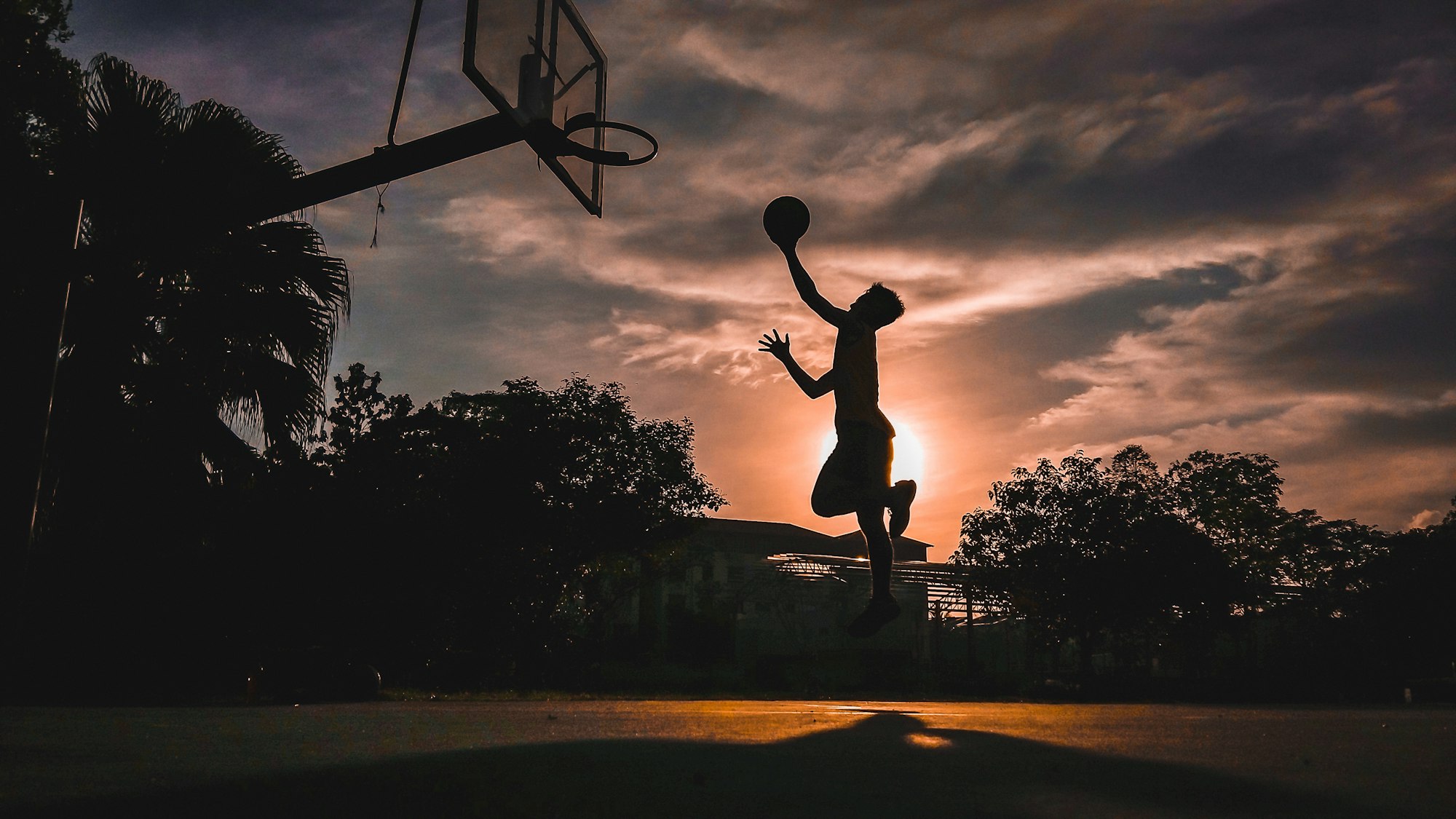Imagine you are a basketball player, and you have to take a crucial free throw in the final seconds of a game. How do you prepare yourself for this moment? Do you just walk up to the line and hope for the best? Or do you mentally rehearse how you will shoot the ball, how it will fly through the air, and how it will swish through the net?
If you chose the second option, you are using a technique called mental rehearsal. Mental rehearsal is a practice session that takes place in the mind. It is used to achieve specific cognitive or motivational outcomes, such as learning and performing skills, strategies, and routines. It can be done individually or in a team setting.
Mental rehearsal is not only useful for basketball players, but for anyone who wants to improve their performance and wellbeing in sport and exercise. Whether you are an elite athlete, a recreational exerciser, or a beginner, mental rehearsal can help you achieve your goals and overcome your challenges.
But what exactly is mental rehearsal, and how does it work? What are the benefits of mental rehearsal for sport and exercise? How can you use it effectively, and how can you evaluate and improve your mental rehearsal skills?
Mental rehearsal is a technique of mentally practicing a skill or activity without physically performing it
Mental rehearsal can be classified into different types, depending on the process and content of the mental activity. Some of the common types are imagery, self-talk, and observation. Imagery is the creation or recreation of sensory experiences in the mind, such as visualizing a successful performance or feeling the sensations of a movement. Self-talk is the use of verbal statements or cues to direct attention, regulate emotions, or enhance confidence. Observation is the process of watching oneself or others perform a skill or behaviour, either live or through a recording.
Mental rehearsal has many benefits for athletes and exercisers. It can enhance performance and improve mental health by preparing the mind for action and helping the brain learn physical tasks. It can also enhance motivation, concentration, self-efficacy, and emotional regulation. Moreover, it can facilitate recovery from injury by maintaining mental skills and promoting healing.
In this article, I explain how mental rehearsal works, benefits of mental rehearsal in sport and exercise, how to use mental rehearsal effectively, and how to evaluate and improve mental rehearsal skills.
How Mental Rehearsal works
Mental rehearsal involves imagined, mental practice of performing a task as opposed to actual practice. That is, when engaging in mental rehearsal, one imagines performing without having to actually do anything. This can be done using nonverbal or verbal processes, such as visualization, observation, or positive self-talk.
Mental rehearsal works by activating the same brain regions and neural pathways that are involved in the actual execution of the task. This means that mental rehearsal can strengthen the neural connections that underlie the physical skill or behaviour, making it easier and more automatic to perform. Mental rehearsal can also help the brain anticipate and prepare for the sensory and motor feedback that will occur during the actual performance, enhancing the accuracy and efficiency of the movement.
Mental rehearsal can improve performance by influencing various cognitive and motivational factors, such as attention, memory, confidence, self-efficacy, and emotional regulation. By mentally rehearsing a skill or strategy, one can improve one’s attention to relevant cues and information thereby honing attentional control, and reduce distractions and errors. By mentally rehearsing a successful performance or outcome, one can enhance one’s memory and recall of the optimal sequence and timing of actions. By mentally rehearsing positive self-talk and emotions, one can boost one’s confidence and self-efficacy, and cope better with stress and anxiety.
Mental rehearsal can be applied to various aspects of performance psychology, such as learning new skills, improving existing skills, developing routines and strategies, preparing for specific situations or opponents, coping with injuries or setbacks, and enhancing motivation and enjoyment. For example, a golfer can mentally rehearse the correct swing technique before hitting the ball; a basketball player can mentally rehearse a free throw routine before taking a shot; a runner can mentally rehearse the pace and terrain of a race before starting; a soccer player can mentally rehearse different scenarios and responses during a game; an injured athlete can mentally rehearse the rehabilitation exercises and the return to play; and an exerciser can mentally rehearse the benefits and rewards of physical activity before engaging in it.
Benefits of Mental Rehearsal in Sport and Exercise
Now that you know how mental rehearsal works, you may wonder what are the benefits of using this technique in sport and exercise. The answer is: many! Mental rehearsal can help you improve your performance and wellbeing in various aspects of sport and exercise psychology, such as:
• Learning and mastering new skills. If you want to learn a new technique, a new strategy, or a new routine, mental rehearsal can help you to remember and execute the optimal sequence and timing of actions, and to avoid errors and mistakes that may happen during the actual performance.
• Improving your existing skills. If you want to improve your speed, accuracy, power, or endurance, mental rehearsal can help you enhance your motor learning and performance, and to make your skill more automatic and efficient. You can also mentally rehearse different levels of difficulty or intensity, and adjust your performance accordingly.
• Developing and following routines and strategies. If you want to prepare yourself for a specific situation or opponent, such as a competition, a test, or a rival, mental rehearsal can help you plan and practice your warm-up routine, your game plan, or your coping strategy. You can also mentally rehearse how to execute the routine or strategy consistently and effectively.
• Preparing for specific situations or opponents. If you want to familiarize yourself with the environment, the rules, the expectations, and the characteristics of a specific situation or opponent, mental rehearsal can help you to visualize and anticipate the scenario that you will face, and to respond to any challenges or changes that may arise. You can also mentally rehearse how to deal with any stressors or distractions that may occur during the situation or with the opponent.
• Coping with injuries or setbacks. If you suffer from a sprain, a fracture, or a loss, mental rehearsal can help you maintain your mental skills and confidence, and avoid losing touch with your sport or exercise. You can also mentally rehearse the rehabilitation exercises and the return to play, and promote your physical and psychological healing.
• Enhancing your motivation and enjoyment. If you want to increase your intrinsic motivation and satisfaction with your sport or exercise, mental rehearsal can help you set goals, reward yourself, or have fun. You can also mentally rehearse the benefits and rewards of your sport or exercise, such as health, fitness, socialization, or achievement.
How to use Mental Rehearsal effectively
Mental rehearsal is a powerful technique that can help you improve your performance, but it requires some planning and practice to make it work. Here are some factors that influence the quality and outcome of mental rehearsal, and some guidelines and tips for using it effectively:
• Start with a clear intention. What is it that you intend to achieve in your performance? What are your goals and expectations? How do you want to feel and behave? Having a clear intention will help you focus your mental rehearsal on the aspects that matter most to you.
• Center yourself physically and mentally. Before you start your mental rehearsal, make sure you are in a comfortable and relaxed state. Take a slow, deep breath to calm your nerves and clear your mind. You can also use some relaxation techniques, such as breath control, progressive muscle relaxation, and mindfulness meditation, to reduce any tension or stress.
• Imagine what your intention would look like. Once you are centered, start visualizing yourself performing the task or activity as you intend to do it. Use all of your senses to make the mental image as vivid and realistic as possible. See yourself moving with confidence and precision; hear yourself speaking with clarity and enthusiasm; feel yourself breathing calmly and smoothly; smell and taste the environment around you; and/or touch the objects or people involved. The more details you can include, the more effective your mental rehearsal will be.
• Correct your mistakes. If you encounter any difficulties or errors during your mental rehearsal, don’t ignore them or get discouraged. Instead, use them as opportunities to learn and improve. Pause your mental rehearsal and identify what went wrong and why. Then, mentally rehearse the correct way to perform the task or activity, focusing on the positive feedback and outcomes. Repeat this process until you feel confident and satisfied with your performance.
• Be creative and have fun. Mental rehearsal is not only a technique for improving performance, but also a way of expressing yourself and enjoying what you do. Don’t be afraid to experiment with different scenarios, perspectives, or emotions during your mental rehearsal. You can also use some humour, music, or imagery to make your mental rehearsal more engaging and enjoyable. The more fun you have with your mental rehearsal, the more motivated and positive you will be.
How to Evaluate and Improve Mental Rehearsal Skills
Mental rehearsal is a skill that can be learned and improved with practice and feedback. It is important to evaluate and monitor your mental rehearsal skills and outcomes, so that you can identify your strengths and weaknesses, and make adjustments as needed. Here are some methods and tools for assessing and enhancing your mental rehearsal skills:
• Use self-monitoring and self-evaluation. Keep a journal or a log of your mental rehearsal sessions, and record the following information: the date, time, duration, and location of your mental rehearsal; the intention and content of your mental rehearsal; the level of vividness, realism, and detail of your mental imagery; the type and frequency of your self-talk; the emotions and sensations you experienced during your mental rehearsal; the difficulties or errors you encountered and how you corrected them; the outcomes and effects of your mental rehearsal on your performance and wellbeing. Review your journal or log regularly, and look for patterns, trends, or changes in your mental rehearsal skills and outcomes. Rate your mental rehearsal skills on a scale from 1 (poor) to 10 (excellent), and identify areas for improvement.
• Use feedback from others. Seek feedback from coaches, trainers, peers, or experts on your mental rehearsal skills and outcomes. Ask them to observe your performance before and after your mental rehearsal, and to provide you with constructive comments and suggestions. Compare their feedback with your own self-evaluation, and look for any discrepancies or gaps. Use their feedback to refine and enhance your mental rehearsal skills and outcomes.
• Use objective measures. Use objective measures such as tests, scores, ratings, or physiological indicators to evaluate the effects of your mental rehearsal on your performance and wellbeing. For example, you can use a stopwatch to measure the time it takes you to complete a task; a scale to measure the weight you can lift; a questionnaire to measure your confidence or anxiety level; and/or a heart rate monitor to measure your arousal or stress level. Compare your objective measures before and after your mental rehearsal, and look for any improvements or changes. Use these measures to track your progress and adjust your mental rehearsal accordingly.
Conclusion
Mental rehearsal is a valuable technique that can help you improve your performance and wellbeing in sport and exercise. By mentally rehearsing your skills, strategies, and outcomes, you can enhance your motor learning and performance, as well as your motivation, concentration, confidence, and emotional regulation. Mental rehearsal works by activating the same brain regions and neural pathways that are involved in the actual execution of the task, and by preparing the brain for the sensory and motor feedback that will occur during the actual performance. To use mental rehearsal effectively, you need to have a clear intention, center yourself physically and mentally, imagine what your intention would look like, correct your mistakes, and be creative and have fun. To evaluate and improve your mental rehearsal skills, you need to use self-monitoring and self-evaluation, feedback from others, and objective measures. Mental rehearsal is a skill that can be learned and improved with practice and feedback. Mental rehearsal is not only a technique for improving performance, but also a way of expressing yourself and enjoying what you do.
Mental rehearsal is an important and relevant technique for sport and exercise. It can help you achieve your goals and overcome your challenges. It can also help you cope with injuries or setbacks, and facilitate recovery. Mental rehearsal is a technique that can be applied to various aspects of sport and exercise performance, such as learning new skills, improving existing skills, developing routines and strategies, preparing for specific situations or opponents, and enhancing motivation and enjoyment. Mental rehearsal is a technique that can benefit anyone who wants to improve their performance and wellbeing in sport and exercise.
Mental rehearsal is a technique that is supported by scientific evidence and practice. However, there is still room for further research and development on mental rehearsal. Some of the possible directions for future research and practice are: exploring the optimal frequency, duration, and timing of mental rehearsal; comparing the effects of different types of mental rehearsal (imagery, self-talk, observation); investigating the individual differences and preferences in mental rehearsal; developing and testing new mental rehearsal techniques or tools; and integrating mental rehearsal with other psychological or physical interventions.
Mental rehearsal is a technique that you can use to improve your performance and wellbeing in sport and exercise. It is simple, effective, and enjoyable. It can help you achieve your potential and enjoy what you do. Why not give it a try?
If you enjoyed reading this article, you may also like this article that summarizes 10 Effective Mental Strategies for Sports Performance Enhancement:















Discussion